Ask Alan
What is “mental toughness”?
There are many definitions for mental toughness. Generally speaking, it describes one’s ability to be consistently determined, confident, focused, and in control when under competitive pressure. Mental toughness establishes an athlete’s overall psychological approach to the game, including his/her emotional mindset and attitude.
Coaches, athletes, and parents are increasingly recognizing the importance of the mental aspects of competitive sport. It is now very common for elite athletes in any sport to enlist a sports psychologist to help them develop the attitudes, beliefs, and motivations required when focusing on executing high-level skills under pressure.
How did you come to focus on mental toughness in your sports psychology practice?
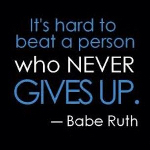 I first encountered the concept of mental toughness during my undergrad program decades ago. I learned more during studies for my Masters and Ph.D., as well as during my sports coaching certification. However, I didn’t fully embrace the value and significance of mental toughness in sport until about 15 years ago. At that point, I was coaching a university women’s golf team, caddying for some high-level players, and supporting my daughter as she rose up in the golf ranks. That’s when I dove into sports psychology literature and started formulating my own approach for helping athletes, and others, achieve their potential through mental toughness. After seeing results year after year, I know that any athlete who gets mental toughness training is at a huge competitive advantage.
I first encountered the concept of mental toughness during my undergrad program decades ago. I learned more during studies for my Masters and Ph.D., as well as during my sports coaching certification. However, I didn’t fully embrace the value and significance of mental toughness in sport until about 15 years ago. At that point, I was coaching a university women’s golf team, caddying for some high-level players, and supporting my daughter as she rose up in the golf ranks. That’s when I dove into sports psychology literature and started formulating my own approach for helping athletes, and others, achieve their potential through mental toughness. After seeing results year after year, I know that any athlete who gets mental toughness training is at a huge competitive advantage.
Why do young elite athletes need mental toughness coaching?
Young athletes need to be mentally tough to compete at the elite level these days, there’s just no question about that. The level of competition and related pressure on youth in sport is far higher today than it was 20 years ago.
 Talented athletes often know at a young age exactly what skills and abilities they need in order to get to the next level of their sport, and the next. They set goals to make it onto a local representative team, a provincial team, a national team, a university team, or to turn pro.
Talented athletes often know at a young age exactly what skills and abilities they need in order to get to the next level of their sport, and the next. They set goals to make it onto a local representative team, a provincial team, a national team, a university team, or to turn pro.
But there’s a lot more to it than just playing well or winning; there’s the added pressure that parents and coaches can transfer to the athlete if they're not careful. Without mental training on how to handle this and other pressures, young athletes often do not live up to their potential.
Mental toughness mostly comes from within and is mostly evident in an athlete’s unshakeable belief in himself/herself. I teach athletes how to build this attribute for themselves, drawing heavily on their love of competition and the support they receive from family, friends, and coaches.
Right now, young athletes who get mental training are at an advantage. Before too long, however, I expect it will become a necessity for players who have aspirations of getting a sports scholarship or turning professional. From what I’m seeing, in short order, almost every athlete with any kind of coaching and concerned parents in his/her entourage will be seeking out sport psychology coaching.
Why are you offering seminars for the parents of youth athletes?
In the past 15 years, I’ve worked with a lot of young elite athletes. Parents of these high performing youth often ask for help in figuring out how best to support their kids. They want to be proactive and learn what to do. Parents assume - correctly! - that it’s easier to prevent issues from developing than to address problems later. Most of us have seen parents doing the wrong things, but the right things are not always obvious or intuitive.
If I could fix just one thing for elite athletes it would be how their parents handle themselves in trying to help them with their sport. I truly believe that the strength of an athlete’s support system can make or break a career.
What is the biggest thing parents get wrong with their young athletes?
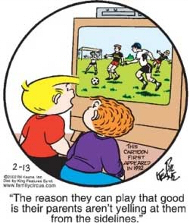 As the father of an athlete myself, I discovered this the hard way: parents need to learn how to be disappointed for their child and not in their child. Parents want so much for their children to do well and be successful in their sport but when things don’t work out, oftentimes the disappointment shows in a parent’s body language or in what they say or do, even when it is unintentional and/or well-intended. The child may interpret it as being disappointed in him/her, and it begins to erode his/her confidence.
As the father of an athlete myself, I discovered this the hard way: parents need to learn how to be disappointed for their child and not in their child. Parents want so much for their children to do well and be successful in their sport but when things don’t work out, oftentimes the disappointment shows in a parent’s body language or in what they say or do, even when it is unintentional and/or well-intended. The child may interpret it as being disappointed in him/her, and it begins to erode his/her confidence.
My seminars and forthcoming book for parents of athletes will help. I encourage parents to be much more up front with their children about their role as parent. While it’s critical to have honest conversations, parents have to know what to say, how to say it, and when to say it.
I’ve also developed a philosophy for parents of young athletes; I make it really clear why and where parents are supposed to have input, and why and where they should not.
What happens when parents are unable to provide the right type of emotional support to a young athlete?
Over the years, I’ve seen many promising young athletes fail to reach their potential. One of the most common reasons is that they feel unsupported in some way.
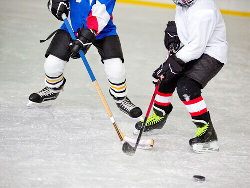 Feeling unsupported is the death knell of mental toughness for all athletes, but especially for youngsters. Our sport confidence comes from knowing that someone has our back. If we don't feel this kind of unqualified support, we will not go out there and risk giving it our all, come hell or high water. Once that confidence is shaken, self-doubt and negative thoughts creep in and undermine performance.
Feeling unsupported is the death knell of mental toughness for all athletes, but especially for youngsters. Our sport confidence comes from knowing that someone has our back. If we don't feel this kind of unqualified support, we will not go out there and risk giving it our all, come hell or high water. Once that confidence is shaken, self-doubt and negative thoughts creep in and undermine performance.
Many young athletes feel pressure because their parents invest a lot of money in coaching, sport psychologists, nutrition and fitness coaching, and all the equipment and travel costs associated with competing at the elite level. They can also feel guilty about how much time their parents commit to helping them in their sport. We've all heard the hockey stories of parents getting up at 4 o'clock to drive around the province. Depending on the sport, the investment of time and energy and money can be very high and the entire family often makes sacrifices, such as the absence of family vacations.
Young elite athletes can feel stressed about their sport performance and possibly feel guilty about their family’s commitment to their sport. If parents don’t know how to intervene with the right type of supports, the typical result is that the child feels alone. It’s one thing to be alone when you’re happy but it’s quite different to be alone when you’re under duress in your sport - especially when that sport means everything! For a young person, feeling really alone when the chips are down is the worst place to be. This quickly erodes confidence and the ability to be mentally tough.
In short, young athletes absolutely need a support structure in which they know somebody has their back. Otherwise, they will doubt themselves, they will not perform at their best, and they will likely not reach the sport goals and ambitions they set for themselves.
What signs should a parent look for that their young athlete is struggling with stress?
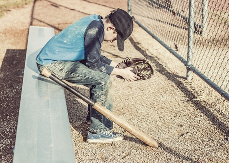 Many young athletes come to me saying they're not having any fun in their sport anymore. Their comments indicate that they have started to engage in their sport for other reasons. Often, winning becomes supreme and it is considered the only mark of success. They don't understand that they can play really well and still lose, or that they can play really poorly and still win. When the joy goes out of their sport, athletes tend to become angry easily, and they tell me they feel they are fighting against the world because they feel so alone.
Many young athletes come to me saying they're not having any fun in their sport anymore. Their comments indicate that they have started to engage in their sport for other reasons. Often, winning becomes supreme and it is considered the only mark of success. They don't understand that they can play really well and still lose, or that they can play really poorly and still win. When the joy goes out of their sport, athletes tend to become angry easily, and they tell me they feel they are fighting against the world because they feel so alone.
Parents may observe increased frustration and anger in their child, or the child may become sad, despondent, and unmotivated. Parents need to be on the lookout for such signs. It’s important to find a good sports psychologist to get to the bottom of the problem and get things back on track.
What will happen if these issues are left unaddressed?
 Many of the youth athletes I work with are between the ages of 12 and 16. These are highly influential years, and what happens during this period impacts the rest of our lives because that's when we become who we are.
Many of the youth athletes I work with are between the ages of 12 and 16. These are highly influential years, and what happens during this period impacts the rest of our lives because that's when we become who we are.
Getting it dramatically wrong could potentially lead to significant insecurities. I’ve seen kids with great potential that never gets realized; they get very close to being at the top of their sport and all of a sudden they stop because of a fear of failure or a fear of success.
On the flipside, getting this right can set young people up for success throughout life. Learning to handle stress and pressure during these formative years will help them function better when pressure comes later, whether that's in education, jobs, or relationships. Regardless of what happens in their sport, learning to handle pressure with confidence - to become mentally tough - prepares them better for life, period.
Why invest in sport psychology coaching for young athletes?
Investing in the young athlete’s emotional health and mental toughness just makes sense. The result is typically a more successful athlete, but more importantly, a happier child.
Sports psychology training or coaching means young athletes tend to have more fun in their sport and realize more success. They tend to have more rewarding careers both with sport and beyond.
Investing in mental toughness training protects the parents’ investment in their child’s sport in terms of the time, effort, and emotion expended. Relative to the overall cost of participating in many sports, it is not expensive.
Increasingly, sports psychology is being recognized as a very important component of every young athlete’s tool set. To succeed at the highest levels, most athletes with talent will need good technical coaching, fitness and nutrition expertise, and a sports psychologist. Athletes need to fully commit to being the very best they can be, and then they have to have all the tools necessary to be prepared for competition. Building their confidence to perform under pressure is key; they must learn to be mentally tough because that’s the best feeling an athlete can experience.
What specifically can you help young athletes accomplish?
I teach them how to truly believe in themselves, how to be properly focused, how to be confident when training/practising and competing, and how to stay motivated. (And that goes for athletes of all ages!)
What can you help parents of athletes accomplish?
 I can help them become better parents—both in sport and beyond. As I learned through my personal experience, working with young athletes to develop mental toughness creates a roadmap towards better parenting.
I can help them become better parents—both in sport and beyond. As I learned through my personal experience, working with young athletes to develop mental toughness creates a roadmap towards better parenting.
Watching kids mature and flourish in sport is an amazing experience as a parent—and as a sport psychologist! Nothing compares to seeing young people grow and develop, and begin to believe in themselves. It is a gift to see kids try so hard and then get what they want.
What’s your mission?
My mission is to help athletes develop into confident and resilient individuals. To do that, I help them foster a deep reliance on themselves and on their support systems. Over the last 15 years, the outcome has been happier kids and happier families. These young people grow up to be very capable of handling what the world throws at them.
 Sadly, I’ve worked with some very gifted athletes who had to give up their sport because their families did not know how to manage the pressure. Competitive sports can be really hard on entire families and I see some parents fragmenting under this pressure. For most of them it's not because of time, effort, energy, or money: it’s because they don't have the knowledge to handle their children’s disappointment or lack of success. The impact on their children can be extremely confusing and stressful for parents.
Sadly, I’ve worked with some very gifted athletes who had to give up their sport because their families did not know how to manage the pressure. Competitive sports can be really hard on entire families and I see some parents fragmenting under this pressure. For most of them it's not because of time, effort, energy, or money: it’s because they don't have the knowledge to handle their children’s disappointment or lack of success. The impact on their children can be extremely confusing and stressful for parents.
All parents want to do the best they can for their children, but in this increasingly complex world of competitive sports, it can be tough to know how to provide the best support. Using the right techniques can minimize stress for the entire family and help ensure that what everyone is working so hard to achieve has the best chance of being realized.
What sets you apart as a sports psychologist?
Parents often say that I’m the calm in their hectic sport world; I’m empathetic, easygoing, and endlessly supportive. Yet, I have no trouble at all asking tough questions to get at the root of a problem.
With young athletes, I'm really concerned about the entire family; I think that makes my practice unique. I have a person-centered, holistic approach and I make it clear that I'm one part of their team. I try to make what I do very practical and pragmatic, rather than theoretical. I never ask clients to do something they can’t put down on paper or touch.
In terms of my background, I am exceptionally well-equipped for the job! I’m an educator, a coach, and a psychologist who’s also been a competitive athlete and the father of a competitive athlete. I’ve worked with elite athletes of all ages across a wide variety of sports. It seems to be a winning combination, as all my clients to date have come through word of mouth. Success stories get passed from one athlete or parent to another.
![]()
Golf on Auto Focus: Training Your Brain to Better Your Game
Why did you write Golf on Auto Focus?
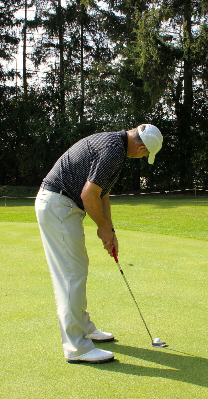 I’ve spent a lot of time on golf courses - as a player, a caddy, a coach, a sports psychologist, and as the father of an elite golfer. I have been privy to conversations with lots of high performance golfers. I noticed that many of them complained about being “off” their game at times, and they were completely unable to say why. The more I looked, the more I realized that this phenomenon affects golfers at all levels.
I’ve spent a lot of time on golf courses - as a player, a caddy, a coach, a sports psychologist, and as the father of an elite golfer. I have been privy to conversations with lots of high performance golfers. I noticed that many of them complained about being “off” their game at times, and they were completely unable to say why. The more I looked, the more I realized that this phenomenon affects golfers at all levels.
I figured there had to be a reason why even really good players lose their focus, and complain about the negative impacts it has on their game. So I set out to solve the riddle of the inconsistent golf game. My research included interviewing dozens of golfers, observing hundreds more, and reading every book on the “mental game” that I could get my hands on. Finally, I identified what appeared to be a gap in the typical pre-shot routine that allowed technical thoughts, doubt, and distraction to derail a shot - and sometimes even an entire round. Once I knew what the problem was, I designed a strategy to fix it - a technique I named “Auto Focus”.
A researcher by profession, and being very skeptical of passing and unproven fads, I had to test Auto Focus under real golf conditions. I enlisted another researcher and with some mid-handicap players as participants, I demonstrated that my focusing strategy reliably improved scores and golf confidence.
I subsequently used Auto Focus with golfers of all skill levels with great success, and I now want to share the strategy more widely through this book.
I’ve also discovered that the underlying mental processes involved in Auto Focus provide benefits to athletes in many other sports, and to individuals in their life and workplace. These processes have become some of the most important tools in my mental toughness toolbox.
How does mental toughness training help golfers?
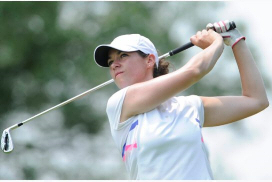 Mental toughness is the most important element of golf psychology. It establishes a player’s psychological approach to the game as well as their emotional mindset and attitude. Being mentally tough is a lot more than just being successful when the pressure is on. Mentally tough golfers have a “psychological edge” that enables them to cope with the considerable demands of the sport.
Mental toughness is the most important element of golf psychology. It establishes a player’s psychological approach to the game as well as their emotional mindset and attitude. Being mentally tough is a lot more than just being successful when the pressure is on. Mentally tough golfers have a “psychological edge” that enables them to cope with the considerable demands of the sport.
Mental toughness training helps any athlete in any sport. The primary importance of becoming and remaining fully focused in the face of competition cannot be overstated. Golfers can ardently believe in themselves, be highly motivated, be fully prepared, and have an insatiable desire to win, but it will all go for naught if they cannot bring their mind to properly focus under competitive pressure.
Golfers have a unique set of challenges when it comes to focusing because of the nature of golf. They hit a shot and have to wait 8-12 minutes (or more) for the next one. Thus, there are many, many opportunities to lose focus over the course of a long, social game. With so much time to think and worry and analyze, focus and confidence can quickly erode.
The good news is that mental toughness attributes can be learned. Golf on Auto Focus: Training Your Brain to Better Your Game not only walks golfers through the key elements of building mental toughness, it provides a specific and targeted technique to enable them to fully and properly focus under pressure. Auto Focus is a focusing mechanism that golfers can depend on when executing every type of golf shot under any condition.
How does Auto Focus look in practice?
For this technique to be easily adopted by golfers, I knew it had to fit onto the end of what is popularly called the “pre-shot routine”. The pre-shot routine is a mental activity players execute to calm their mind. It's a very methodical, consistent pattern of mental and physical actions that get a golfer prepared to hit a shot under the best possible emotional and mental conditions.
In developing Auto Focus, I copied what golfers physically do just before they hit the ball and I designed a  mental rhythmical cadence to complement these actions. Then, because I'm a researcher and a golfer and very inquisitive, I decided to conduct an empirical study to assess whether Auto Focus would improve golfers’ scores as well as their confidence, which is a huge issue in sport, and particularly in golf.
mental rhythmical cadence to complement these actions. Then, because I'm a researcher and a golfer and very inquisitive, I decided to conduct an empirical study to assess whether Auto Focus would improve golfers’ scores as well as their confidence, which is a huge issue in sport, and particularly in golf.
In layman’s terms, Auto Focus teaches a player to be intensely and precisely focused when the golf swing happens, while simultaneously eliminating all distracting thoughts. Most golfers have a lot of mental chatter during a game, which may include worrying about their score, their competitors’ score, and the quality of their swing. My technique helps players focus very intensely when they are actually in the process of striking the golf ball, i.e., when they need it the most.
How did you test Auto Focus with golfers?
Working with another sports psychologist to eliminate any potential bias, I went to a local golf course and recruited participants. We started with 24, but once they had played their preliminary rounds, we whittled it down to 13 players of similar calibre. The outcome was that all participants improved their scoring average using this technique. A repeated measure questionnaire confirmed that golf confidence went up in all players. What’s more, many of them continued to use Auto Focus in the years since and none have reported that it stopped working for them.
Since creating the Auto Focus technique, I’ve used it with about 30 golfers I’ve coached individually, both amateurs and professionals. The results have been very consistent with improved scores and confidence.
How can Auto Focus be more broadly applied?
While Auto Focus was designed to specifically address a focusing problem in golf, the fundamental concepts behind it apply to high level athletes in all sports. Most athletes who have performance difficulties struggle with focus and confidence. I have found that the concepts of Auto Focus can be important elements in getting them back on track.
Similarly, the concepts of Auto Focus are now part of my overall approach to mental toughness coaching and I’ve used them successfully in sports as diverse as hockey, swimming, diving, running, curling, karate, and basketball.
These elements of mental toughness have also proven beneficial for coaches in many sports and they have a variety of applications in the work world. Human beings have an innate and deep desire to do well in their chosen endeavors. Who does not want their athletes or employees to perform their best more often?
![]()